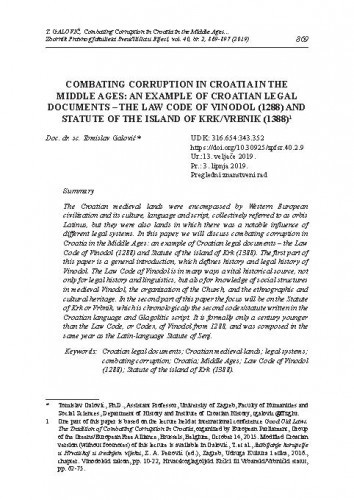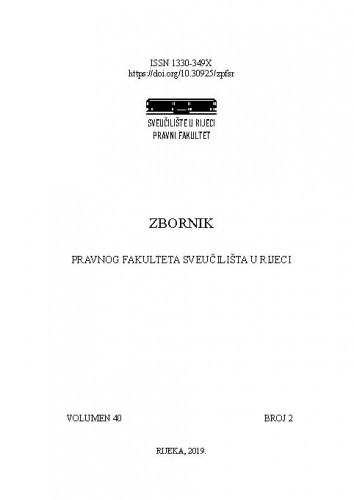The Croatian medieval lands were encompassed by Western European civilization and its culture, language and script, collectively referred to as orbis Latinus, but they were also lands in which there was a notable influence of different legal systems. In this paper, we will discuss combating corruption in Croatia in the Middle Ages: an example of Croatian legal documents – the Law Code of Vinodol (1288) and Statute of the island of Krk (1388). The first part of this paper is a general introduction, which defines history and legal history of Vinodol. The Law Code of Vinodol is in many ways a vital historical source, not only for legal history and linguistics, but also for knowledge of social structures in medieval Vinodol, the organization of the Church, and the ethnographic and cultural heritage. In the second part of this paper the focus will be on the Statute of Krk or Vrbnik, which is chronologicaly the second codex/statute written in the Croatian language and Glagolitic script. It is formally only a century younger than the Law Code, or Codex, of Vinodol from 1288, and was composed in the same year as the Latin-language Statute of Senj.; Hrvatski srednjovjekovni prostori bili su dionici zapadno-europske civilizacije, kulture, jezika i pisma, što se zajednički naziva orbis Latinus, ali ujedno i prostori na kojima je primjetan utjecaj različitih pravnih sustava. U ovome radu raspravit ćemo temu suzbijanja korupcije u Hrvatskoj u srednjem vijeku na primjeru pravnih spomenika na hrvatskom jeziku: Vinodolskom zakonu (1288.) i Krčkom-Vrbničkom statutu (1388.). U prvom dijelu rada donosi se opći uvod u kojem se definira povijest i pravna povijest Vinodola. Vinodolski zakon mnogostruko je važno povijesno vrelo, ne samo za pravnu povijest i filologiju, već za poznavanje društvenih struktura Vinodola, crkvenoga ustroja, etnološke i kulturne baštine. U drugom dijelu rada naglasak je stavljen na Krčki ili Vrbanski/Vrbnički statut koji po starini zauzima drugo mjesto među zakonicima-statutima pisanim hrvatskim jezikom i glagoljskim pismom. Formalno tek jedno stoljeće mlađi od Vinodolskog zakona ili zakonika iz 1288. godine, a sastavljen iste godine kada i Senjski statut na latinskom jeziku.
Sažetak

 Zbornik Pravnog fakulteta Sveučilišta u Rijeci : 40,2(2019) / glavni urednik Željko Bartulović.
Zbornik Pravnog fakulteta Sveučilišta u Rijeci : 40,2(2019) / glavni urednik Željko Bartulović.